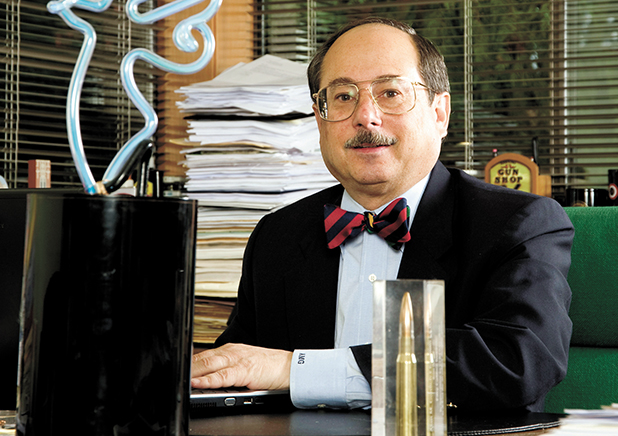This was no surprise. From the moment the first election-night returns trickled in on the first Tuesday in November, unquestionably showing that Initiative 594—Washington’s attempt at expanding gun background checks by a vote of the people—would be approved, it was clear that the next act would unfold in the courtroom. “We’re expecting a lawsuit,” Zach Silk, campaign manager for Washington Alliance for Gun Responsibility, told Seattle Weekly amid celebratory toasts at the Edgewater Hotel, where the pro-I-594 election-night party was just hitting its stride. The opposition, Silk noted, was not expected to go down easily, and had a very litigious reputation.
Silk’s prediction proved accurate last week when a group of 12 plaintiffs, including Bellevue’s Second Amendment Foundation and its bow-tied leader, Alan Gottlieb, chose a federal court in Tacoma to file a lawsuit seeking a permanent injunction against the parts of I-594 that they argue are unclear or go too far. The court filing marked the continuation—and, with luck, the eventual conclusion—of a semantics argument that’s taken on a life of its own.
For voters, the main selling point for I-594–which took effect December 4—was the closure of the so-called “gun-show loophole,” requiring background checks on all gun sales, including those via the Internet. (Pressed, not even Gottlieb seems to have much issue with these types of checks.) However, with this new lawsuit, anti-I-594 forces are taking aim at a very specific aspect of the initiative that requires background checks also on the transfer of firearms. The plaintiffs argue that these new rules—which define a firearm transfer as “the intended delivery of a firearm to another person without consideration of payment or promise of payment, including, but not limited to, gifts and loans”—violate the Second and Fourteenth Amendments. Furthermore, they say the new law is so unclear that law-abiding citizens can’t understand it—and are likely to be drawn into criminal activity because of it. “I-594 is . . . so vague that a person of ordinary intelligence cannot understand its scope,” the lawsuit argues.
In the end, it all comes down to whose interpretation of the word “transfer” you prefer. While I-594 included a host of instances in which a background check would not be required for a firearm transfer (for example, gifts between immediate family members, anything involving an antique gun, anything that would prevent imminent danger, or loans at authorized shooting ranges), Gottlieb and his team of lawyers argue that, as it’s written, I-594 makes all sorts of innocent activities illegal and/or needlessly arduous: say, a non-married but cohabiting couple sharing a weapon for self-defense or a security company supplying its employees with firearms.
“All of this makes it impossible to comply with I-594 and thus criminalizes a significant number of transfers that take place on short notice or are necessarily repetitive,” explains lead attorney Steven Fogg, a hotshot partner at Corr Cronin Michelson Baumgardner Fogg & Moore LLP, the Seattle-based firm that will argue the suit.
“They were trying to write something as draconian as they could,” Gottlieb says of the motivations of I-594’s crafters. “There’s definitely a public interest in keeping firearms out of the hands of dangerous people . . . [But] they just went way overboard.”
It’s certainly a compelling argument
—one easy for skeptics of gun-control efforts to latch onto. The problem, according to Geoff Potter, communications director for the Washington Alliance for Gun Responsibility, is that the challenge to I-594 is simply not based in reality. Potter says the initiative’s definition of “transfer” is similar to those in existing background-check laws in six other states across the country, and points out that I-594 has been in effect in Washington for more than a month while none of the doomsday scenarios and complications the plaintiffs foresee have materialized. He maintains that the offensive mounted by the opposition via the lawsuit amounts to little more than the same scare tactics that proved unsuccessful during the campaign.
“The actual implementation and adoption of 594 is going really well and really effectively,” Potter says. “This is not actually going to put individuals in the kind of legal jeopardies they’re claiming. What we’re seeing is more and more evidence build of how there simply isn’t anything behind these claims.”
“The suit is frivolous and without merit,” Potter continues. “They are trying to create this impression of a burden where one hasn’t existed.”
If a burden has been created, perhaps it’s in the federal courts, where a judge in Tacoma will now be tasked with wading through and trying to make sense of the various arguments. In the opinion of Hugh Spitzer, a prominent state and constitutional law professor who currently teaches at the University of Washington, the plaintiffs likely have an “uphill battle” in front of them.
“My reaction is that, primarily, they don’t like the definition of the word ‘transfer,’ but it’s not unclear,” Spitzer says of the argument presented after studying the lawsuit. “It’s a very broad definition, and I think the challengers don’t like the breadth of the definition. . . . But just because somebody can think of situations where they aren’t sure whether a court would rule the activity an illegal transfer or not . . . that doesn’t mean the statute should be void for vagueness.
“I think the challengers just don’t like the fact that the law makes so many things illegal,” Spitzer concludes.
In a debate as contentious and convoluted as this one has become, that might be the only thing everyone can agree on.
mdriscoll@seattleweekly.com








